With her eyes fixed and unblinking, her legs bent, and her tail twitching, your cat sets her sights on that catnip mouse. She creeps steadily forward until—ATTACK! That toy never had a chance. Your cat’s stalking behavior is definitely entertaining. You could watch it all day long, but have you ever wondered why your pampered house cat seems to love this game of big cat make-believe? Your stalking cat can look like a miniature lion on the Serengeti, but catnip mice aren’t exactly zebra and antelope. So why does she do it? Is it even healthy? Should you encourage it? Here’s what you should know about your little living room lion.
Stalking Is A Cat’s Instinct
While your cat doesn’t look like much of a predator when she’s eating her meals out of a ceramic bowl and lounging in her luxury cat tree, she’s surprisingly similar to the big cats in the wild. A study done in 2013 shows that domestic house cats share 95.6 percent of their DNA with tigers. That’s not hard to believe when you remember your cat’s ancestors used to be wild. They didn’t live in warm homes and humans didn’t deliver their meals. They were in charge of feeding themselves, and that meant hunting.
Unless you’ve taken in a feral cat, your friendly feline has likely never had to hunt for her own food. This doesn’t mean, however, that she has never stalked “prey.” Stalking and hunting are part of a cat’s natural instinct. Even though they no longer need those skills for survival, cats are still driven to stalk, hunt, and even attack.
All Cats Can Stalk
It doesn’t matter if a cat is a spoiled pet or a stray learning to live on their own, all cats are capable of stalking. A cat’s body is built for stealth, and they’re naturally good at hunting. They have incredible flexibility, a strong sense of smell, eyesight that can detect even slight movement, a tail for balance, and whiskers for spatial awareness. Combine all of that with their natural instinct to sneak up on prey, and you have a pet that is a skilled hunter.
Most stalking cats learn the behavior from their mothers. But even kittens that were separated from their mothers too early go on to learn how to stalk all on their own. It’s ingrained in their DNA.
A Stalking Cat Is A Happy Cat
Your cat has no real reason to start stalking in your home, but that doesn’t mean it’s not important. Like dogs and people, cats get bored easily. They need exercise and mental stimulation if you want them to be fully satisfied with life. If your cat doesn’t have the opportunity to stalk, you might notice undesirable behavioral habits. They might act out by refusing to use the litter box or tearing up the furniture. There’s also the chance they’ll sink their claws into human body parts to express their frustration.
Stalking is important because it’s both a physical and mental exercise. It releases tension, relieves stress, and lets your cat simply act like a cat. There’s the occasional moment when your stalking cat will set her sights on your ankles, but you shouldn’t assume she’s being aggressive. It’s an expression of her natural instinct, and there are ways to encourage that without sacrificing your own limbs.
How To Encourage Your Cat To Stalk
If your cat isn’t naturally stalking, encouraging the behavior could do wonders for her health and happiness. And if your stalking cat has set her sights on the humans in the family, you’ll all be better off if you show her how to redirect those natural instincts.
The most important thing you can do for your cat is provide plenty of opportunities for playtime. Make sure she has an adequate number of toys, and take time out of each day to sit on the floor and play with her. It will only take a few minutes of interaction to bring out your cat’s stalking behavior.
To encourage stalking, try moving a toy in a manner that mimics a small animal. Twitch it slowly side to side and in the air. Wait for your cat to become interested, and then you can really get into playing. You can also give your cat an environment that’s conducive to stalking. Set up obstacles and hiding places with pillows and blankets. Boxes and tunnels are also great for a stalking cat. Whatever you use, make sure your cat knows her stalking behavior (as long as it’s not aimed at you) is perfectly acceptable.
Encouraging your cat to stalk is especially important for indoor cats. They don’t have many opportunities to express their natural instincts. So the next time you see a stalking cat, remember that it’s all part of a cat’s natural behavior.
REMEMBER: ADOPT, DON’T SHOP; FOSTERING SAVES LIVES & SPAY AND NEUTER!
Related Story: Your Cat Is An Obligate Carnivore. Here’s Why They Want You To Remember That.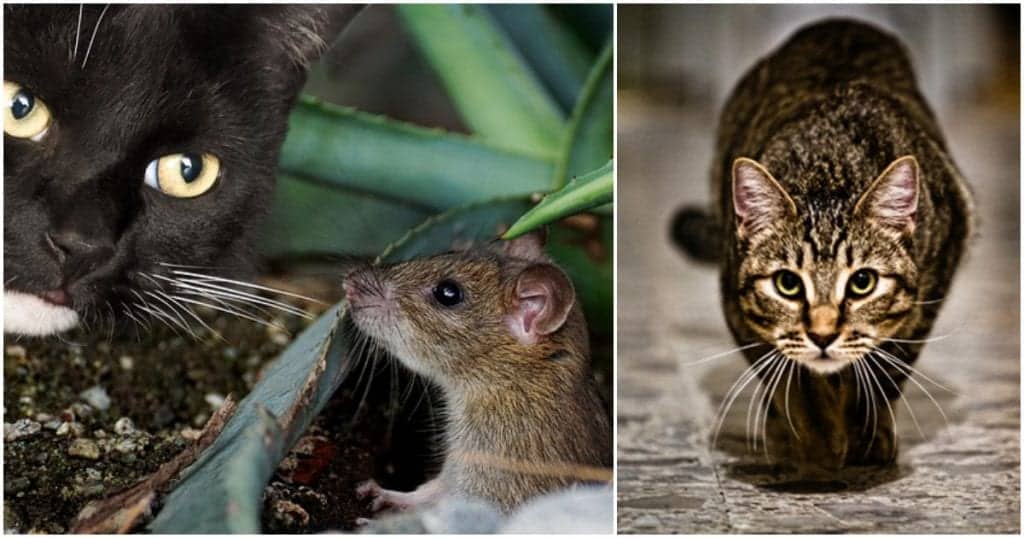




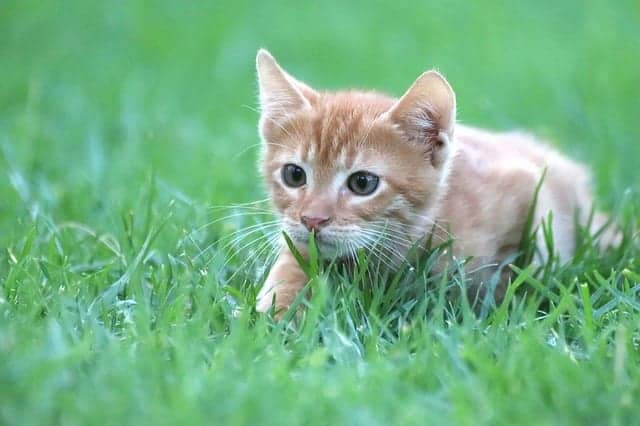
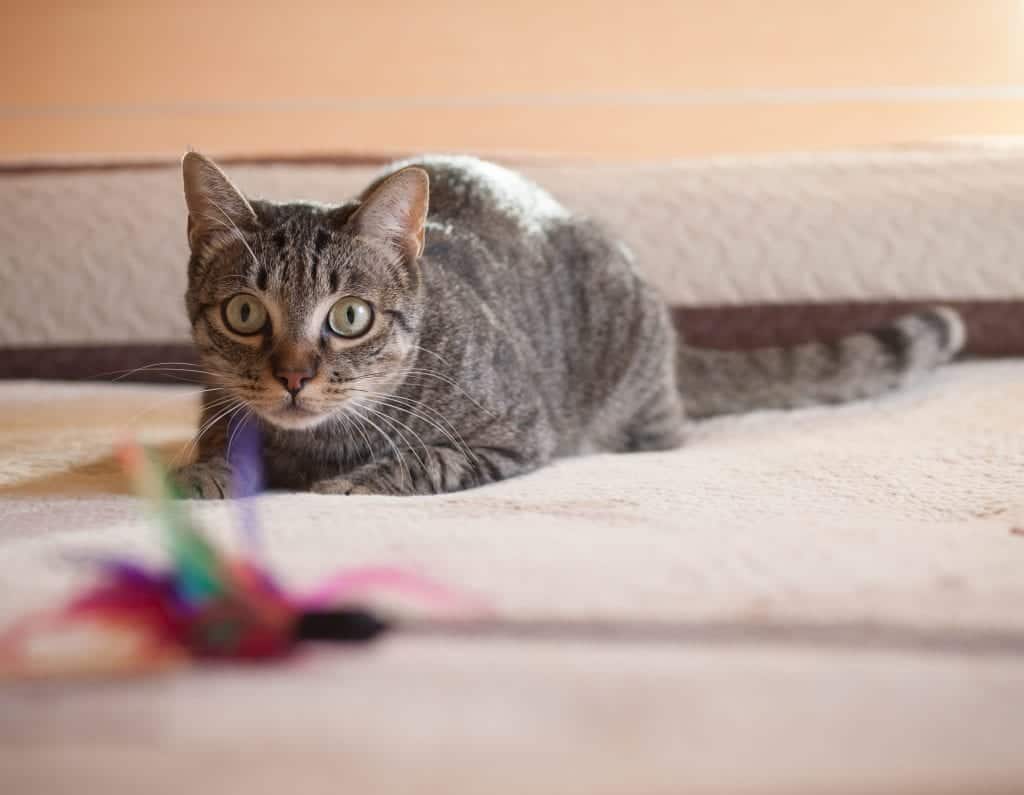


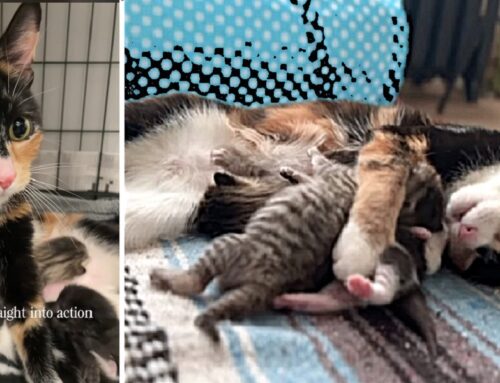

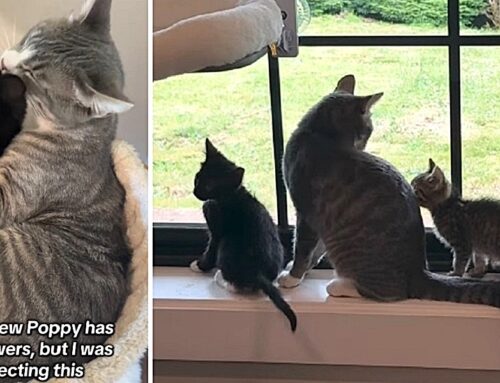

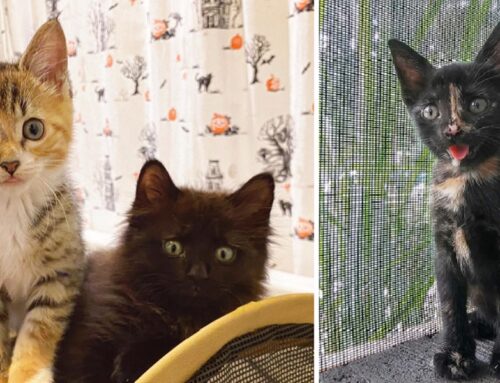


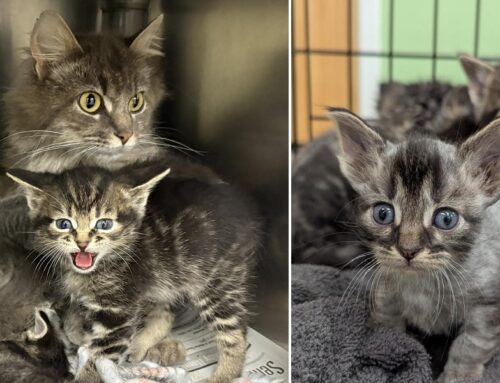
If you get a kitten… get two !! Then they can stalk and attack each other instead of your ankles. Sometimes the best cat toy is another cat.
We had two 11 year old cats (raised from kittens), when we adopted new kitten Jingle… Demon and Jingle took to each other right away, and Demon went through a second kittenhood, trying to keep up. We had a little four pound and a BIG 20 pound cannonball, bouncing off the walls 😱 They nearly destroyed the place, but they were surefun to watch 😁.
I noticed Galaxy stalking me recently, but it’s more along the lines of she sees me as another cat, accepts me as a cat, and is just playing. Used to, she would attack my ankles once she caught up to me, but I find partaking in the action feels a lot like Hide & Seek — and stalking her back is a rather fun activity that gets me exercising a little bit more than usual. It’s also just nice…I’m 30, and playing Hide & Seek isn’t something a lot of 30-year-olds do, unfortunately. I know it’s a “childish” thing, but I’m autistic and don’t care about that part. XD
It’s a pretty great bonding exercise, methinks, especially since it seems to count as playing together. (: